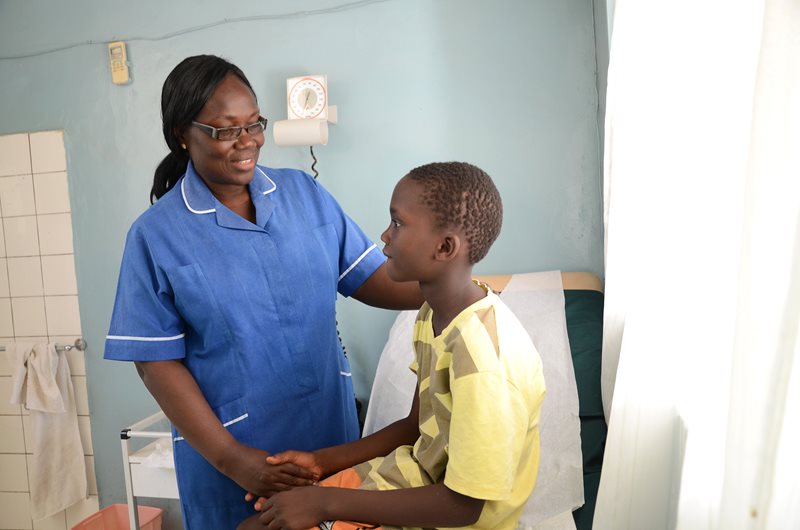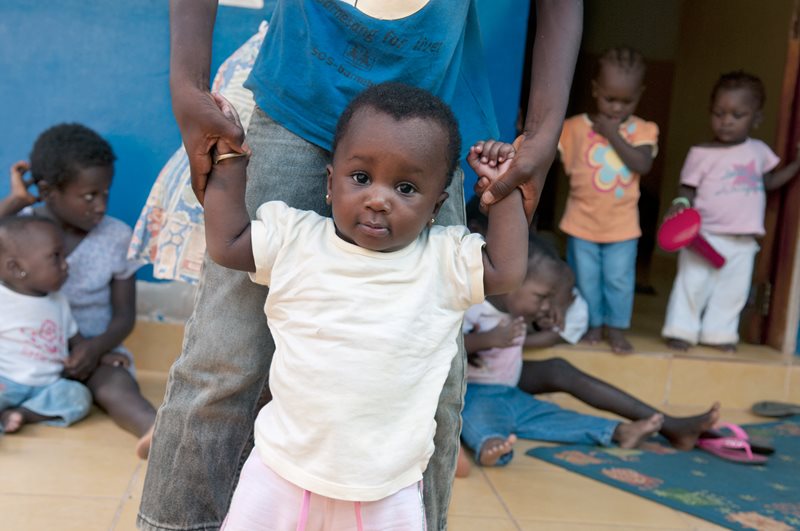Child trafficking and child labour are common in Bakoteh and its surrounding

Nurse examining a child at SOS Medical Centre Bakoteh (photo: C. Ladavicius)
Children in Serekunda often face a tough existence and a life in poverty. Many children are forced to beg for food for themselves and their families. Others fall victim to child trafficking across national borders. Girls are mainly trafficked for sexual exploitation, and many of the boys who are forced into street vending in urban areas of The Gambia come from neighbouring Senegal and Guinea-Bissau. Some children who are sent to religious leaders by their parents for spiritual education end up begging on the street on behalf of these religious leaders. These children are locally known as “almodous”, whereas in Senegal where the phenomenon is even more widespread, they are known as “talibés”.
Children suffer under poverty, lack of adequate education and access to proper medical care
Inadequate education or a complete lack of education is the reality of many children from predominantly poor families, and girls, in general, receive less education and schooling than boys. It is important to ensure that children have access to school and education so that children can break out of a life in poverty. Education will, in the long run, give the children of today the chance to become independent and self-sufficient as adults. This is why education is such an important part of SOS Children’s Villages’ involvement in Bakoteh and its surroundings.
The fact that more than ten per cent of all children born in The Gambia die before they turn five only too clearly illustrates the lack of adequate medical care for thousands of Gambians. Though the rural areas of The Gambia are hit the hardest by poverty, the urban areas of Serekunda are also heavily populated with families and children living at extreme risk. SOS Children’s Village Bakoteh works to reduce the horrific mortality rates for small children by running a medical centre. Childbirth is a critical moment for the mother as well as for the baby, and the SOS Medical Centre in Bakoteh is specialised in assisting mothers at childbirth.
The fact that more than ten per cent of all children born in The Gambia die before they turn five only too clearly illustrates the lack of adequate medical care for thousands of Gambians. Though the rural areas of The Gambia are hit the hardest by poverty, the urban areas of Serekunda are also heavily populated with families and children living at extreme risk. SOS Children’s Village Bakoteh works to reduce the horrific mortality rates for small children by running a medical centre. Childbirth is a critical moment for the mother as well as for the baby, and the SOS Medical Centre in Bakoteh is specialised in assisting mothers at childbirth.
What we do in Bakoteh

My first steps, SOS Children’s Village Bakoteh (photo: C. Lesske)
The medical centre run by our organisation is specialized in supporting mothers and children, and it provides a much-needed place for mothers to give birth to their children in a safe environment with professional staff. Furthermore, the medical centre organises programmes that aim to prevent and inform about cervical cancer and other health issues.
Ten SOS families in Bakoteh provide a loving home for as many as 100 children with no one to care for them, and as the children grow up, they have access to education or vocational training. When children from SOS families become adolescents, they typically move into special accommodation. Here, they live together with other young people from SOS families under the guidance of a qualified educational counsellor while learning to become fully independent.
The SOS Social Centre in Bakoteh supports vulnerable families in the area, and the education of children is a central part of our work here, too. Our efforts make it possible for parents to send their children to school, and parents and carers are supported in acquiring job skills and parenting skills which will enable them to better support and care for their families.